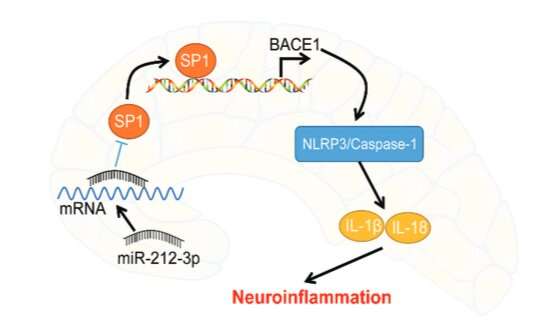This article has been reviewed according to Science X's editorial process and policies. Editors have highlighted the following attributes while ensuring the content's credibility:
fact-checked
trusted source
proofread
A small molecule could help suppress Alzheimer's-related inflammation and protect brain cells

Alzheimer's disease (AD) is a progressive neurological disorder that causes the brain to shrink (atrophy) and brain cells to die. AD is the most common cause of dementia—a continuous decline in thinking, behavioral, and social skills that affects a person's ability to function independently. It affects millions of people around the globe.
Alzheimer's disease typically starts slowly and then progressively worsens. The earliest symptom is usually difficulty remembering recent events, which is often described as forgetfulness. As the disease advances, symptoms can include confusion, irritability, aggression, mood swings, trouble with language, and long-term memory loss. With an aging population, the battle against this devastating disease has never been more urgent. Recently, a team of researchers has uncovered a new potential weapon against Alzheimer's disease.
Building on existing knowledge that the molecule microRNA-212-3p, referred to as miR-212-3p, could play a role in combating Alzheimer's disease, a research team performed a series of meticulous experiments to explore how this might work. The results suggest that boosting levels of miR-212-3p in the brain might help to control inflammation, one of the major players in Alzheimer's disease. These findings shine a beacon of hope for patients and their families and present an exciting avenue for potential future therapies. The findings are published in the Bosnian Journal of Basic Medical Sciences.
Unpacking the science: MicroRNAs, inflammation, and Alzheimer's disease
MicroRNAs, including miR-212-3p, are small molecules found in cells that play a crucial role in controlling the activities of certain genes. Our genes are the blueprint for every protein our bodies make, and by controlling them, microRNAs like miR-212-3p help to keep our bodies functioning properly.
Inflammation is part of the body's natural defense mechanism, but in Alzheimer's disease, this protective response gets out of control and ends up harming brain cells, contributing to memory loss and cognitive decline. The team behind this study wanted to understand whether miR-212-3p could help to control this harmful inflammation and thus fight Alzheimer's disease.
To test their theory, the team conducted a series of careful experiments. They began by injecting a compound called Aβ1-42, known to cause Alzheimer's disease-like symptoms, into rats. They then artificially increased the levels of miR-212-3p in the brains of some of these rats, while others served as control groups.
An exciting discovery: miR-212-3p improves memory and learning
The results were promising. Rats with elevated levels of miR-212-3p demonstrated improved learning and memory capabilities, a sign that the increased presence of miR-212-3p may be able to reverse some of the effects of Alzheimer's disease. This is significant as it is the first time that miR-212-3p has been demonstrated to have such a positive impact.
Building on these positive results, the researchers also found that the increased miR-212-3p reduced the levels of inflammation in the rats' brains. High levels of inflammation are a known driver of Alzheimer's disease, so these findings suggest that boosting miR-212-3p could provide a novel approach to tackle this damaging inflammation and thus slow down or even prevent the development of Alzheimer's disease.
Digging deeper: SP1, BACE1, and inflammation
To understand how miR-212-3p was achieving these impressive effects, the team delved deeper into the molecular machinery of the brain cells. They discovered that miR-212-3p interacts with two other molecules, SP1 and BACE1, effectively dialing down their activity.
SP1 and BACE1 are part of the inflammation-causing pathway in the brain and are known to be overly active in Alzheimer's disease. By turning down their activity, miR-212-3p can help to control the damaging inflammation in the brain, protecting brain cells from harm.
The team confirmed these findings with further experiments in cell cultures, strengthening the evidence for the role of miR-212-3p in controlling inflammation.
Implications and future directions
The findings showed the potential therapeutic role of miR-212-3p in Alzheimer's disease. By showing that this molecule can control inflammation in the brain and improve memory and learning in rats, the research provides a promising lead for the development of new treatments for this devastating disease.
Lead researcher, Dr. Wei Nong from Guangxi University of Chinese Medicine, Nanning, Guangxi, P.R. China, said, "Our research provides a new understanding of how miR-212-3p could play a role in controlling the inflammation that drives Alzheimer's disease. It's the first step towards potentially harnessing this molecule for therapy in the future."
It's essential to note that while these findings are promising, more research is needed. The researchers used a rat model of Alzheimer's disease and human cell cultures in their study. While these are well-established research methods, further research will be needed to confirm these findings in people with Alzheimer's disease.
For instance, a crucial next step will be to investigate miR-212-3p's levels in patients with Alzheimer's disease compared to healthy individuals. The team also plans to delve deeper into how miR-212-3p levels might be manipulated in the human brain to achieve therapeutic effects and evaluate the role of miR-212-3p in AD-induced oxidative stress injury.
"The journey to a potential new treatment for Alzheimer's disease is a long one, and we are still in the early stages," Dr. Zhiquan Wei from Guangxi University of Chinese Medicine, Nanning, Guangxi, P.R. China, added. "Our study is a promising start, but we need to do more research to understand the full potential of miR-212-3p."
While we are still far from a cure for Alzheimer's disease, this study shines a light on a potential new pathway for treatment. By understanding how miR-212-3p operates within the brain, researchers are paving the way for new therapies that could slow or even stop the progression of Alzheimer's disease.
More information: Wei Nong et al, miR-212-3p attenuates neuroinflammation of rats with Alzheimer's disease via regulating the SP1/BACE1/NLRP3/Caspase-1 signaling pathway, Bosnian Journal of Basic Medical Sciences (2022). DOI: 10.17305/bjbms.2021.6723





















